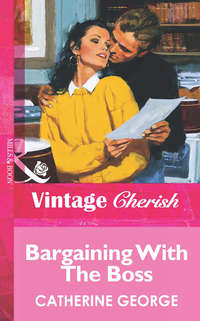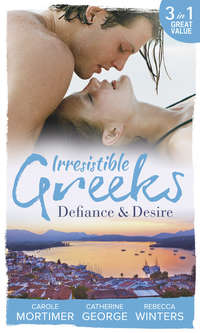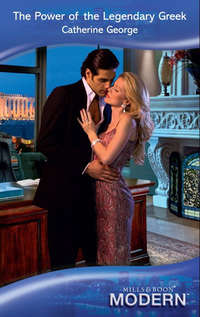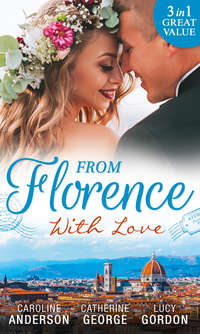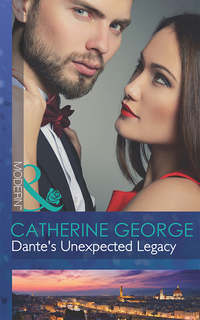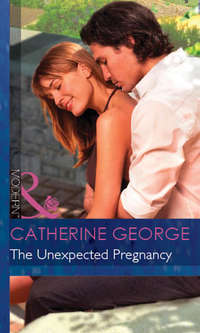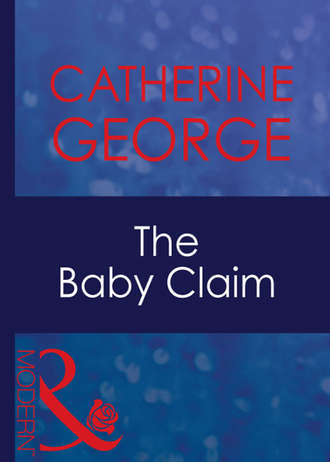
Полная версия
The Baby Claim
Her eyes hardened. In the unlikely event that she ever considered a relationship with a man again she would make sure their aims were mutual. Her experience with Peter had taught her a salutary lesson. Any man in her future must fit certain requirements. He would be older, for a start, equally ambitious, and so successful in his own career he wouldn’t resent hers. Joss smiled cynically. If such a paragon existed he was certain to be married anyway, to a stunningly beautiful woman who was a perfect wife and mother and ran her own thriving business while helping with the children’s homework and producing cordon bleu dinners for twelve.
Joscelyn Hunter’s interest in journalism had first begun when she’d edited the school magazine, which had fired her with such enthusiasm she’d found a job working at weekends and as holiday relief on the local morning paper. She’d started out as a messenger, then progressed to researcher, and soon begun bombarding the editor with so many stories and features he’d eventually accepted one, and she’d never looked back. She had been in her element mixing with journalists, so interested in all aspects of the job she’d made contacts which had won her a full-time job on the same paper, after she had a degree in modern languages and a year’s post-graduate course in journalism under her belt.
At first Joss had loved her job, and with undiminished enthusiasm had covered law courts, local government, industry, the arts and a variety of local events. She’d interviewed a wide range of people, from local members of parliament, county councillors, businessmen, victims of tragedy, to schoolchildren and celebrities of all kinds. But after three years or so Joss had begun to feel inhibited by parochial bias. She’d lusted after a job on a national paper, and in her spare time had regularly submitted features to London dailies. When her efforts had begun to be accepted she’d taken the plunge and left for the capital, where her experience, coupled with the right qualifications and a willingness to work long, irregular hours, had won her jobs as a freelance, doing shiftwork on some of the national dailies.
Joss had set off for London with her father’s blessing and a small legacy left by her mother. But soon afterwards the Reverend George Hunter had died, shortly before his retirement, leaving a grief-stricken Joss without a base in the Warwickshire village of her birth, other than her constant welcome from Anna’s family. But her visits to the Herricks had been few and far between since her relationship with Peter, who had never fitted in with them. Now he was gone she could please herself, and would definitely drive down to Glebe House for lunch one day soon, Joss decided, preferably on one of the Sundays likely to drag a bit from now on.
Once she was settled in the new flat Joss steeled herself to forget Adam—and Peter—and soon found she quite enjoyed living alone. Her job absorbed most of her time, as usual, but now she could suit herself about what time she finished, with no reproaches when she got home, late and tired, to someone expecting her to cook supper and iron shirts. There were definite advantages to being single again.
As a change from reporting on press conferences, demonstrations, or whatever event the news editor wanted covered, one day Joss was told to dig out information about ancestral homes hired out by their owners for corporate entertaining, and spent time consulting with the Daily Post library and electronic database to discover which aristocratic personalities and properties were likely to be most newsworthy.
‘We’ve got some mail for you,’ said Carrie Holt, when Joss was poring over her findings with a lunchtime sandwich. ‘And a message on the machine when we got home last night.’ She handed over a bundle of junk mail and a slip of paper. ‘How are you settling in at the flat?’
‘Very well,’ said Joss with satisfaction. ‘How about you and Notting Hill?’
‘I love it. I don’t know how you could bear to leave the place, Joss.’ Carrie bit her lip. ‘Sorry. I’m a tactless cow. I suppose it was painful once Peter left.’
The message Carrie gave her was brief. ‘I’m back. Ring me at this number. Adam.’
Joss wanted to. Badly. But if she did ring him, Adam, like any man with blood in his veins, would expect to take up where he’d left off. Half of her wanted that so much it made her shake in her shoes, but the other half wouldn’t hear of it. Peter’s treatment had left her so vulnerable it would be madness to plunge into a new relationship. Her mood had been abnormally emotional with Adam that magical night. But she was back to normal now. And normal didn’t include making mad, passionate love with strangers.
But when her phone rang late that night Joss felt oddly disappointed when she found it was just Anna, checking up on her.
‘Are you pining, Joss?’
‘No way. Too busy.’
‘Is everything spick and span at the new place?’
‘Hardly! I’ve only just got delivery of the new furniture, so the place is a mess. Who do you think I am, Superwoman?’
‘Leave it all where it is and come down to stay with us instead.’
Joss was deeply tempted. ‘I’d just love to, but the place is a shambles, Anna. I really must soldier on,’ she said with regret. ‘I’ll come down as soon as I’m a bit straighter.’
‘I’ll keep on until you do,’ threatened Anna, then went on to talk of wedding plans, and afterwards asked what Joss was up to at work, her interest caught when she heard about the article on ancestral homes.
‘One of Hugh’s old schoolfriends does that. He was at the party. Francis something. I’ll tell Hugh to give him a call.’
Next day Joss spent a morning on the phone, setting up interviews with the owners of various ancestral piles she’d decided on for her article, then settled down to one of the more mundane tasks of the freelance journalist, and began sifting through a pile of regional newspapers looking for stories that could be followed up on a national basis. When her phone rang Joss was heartily glad to be interrupted.
‘Miss Hunter?’ asked a light, attractive male voice. ‘My name’s Francis Legh. Hugh Wakefield rang last night, asked me to get in touch. What can I do for you?’
Hugh’s old schoolfriend, Joss learned, was only too pleased to be part of her story on corporate entertaining.
‘Publicity of the right kind never goes amiss,’ he assured her.
‘Would it be possible for me to see you this week?’ asked Joss hopefully. ‘Where exactly do you live?’
‘Deep in the wilds of Dorset. Do you know the area?’
‘Not very well, but if you give me the address I’ll find you.’
‘I don’t suppose you could possibly come on Sunday, Miss Hunter?’ he asked. ‘We’re having some fancy electronics installed during the week. On the other hand,’ he added suddenly, ‘it’s colossal cheek to ask you to give up your time on a weekend—’
‘Not at all. I’d be glad to,’ said Joss quickly. ‘What time shall I come?’
‘Midday,’ he said promptly. ‘I’ll give you lunch.’
The news editor buttonholed her shortly afterwards, with the news that Charlotte Tracy, who covered all the smart events of the season, had rung in to say she was going home early from Ascot with flu.
‘Flu in June,’ said Jack Ormond bitterly. ‘How the hell did she manage that? Anyway, Joss, it means you’ll have to cover Ladies’ Day at the races tomorrow. Thank goodness you can handle a camera—you know the happy-snappy kind of thing Charlotte turns in.’
‘You bet,’ she said with enthusiasm. But no way was she going to Ascot in her normal working gear of trouser suit and T-shirt. She was due at Harrods later, to interview a movie star at a book signing. Afterwards she would dash along the road to Harvey Nichols, splurge on an outfit for Anna’s wedding and wear it to Ascot first.
After her chat with the actress Joss rang in her brief report to accompany the glamour shot waiting to go with it, then spent an hour on choosing a bronze silk suit and large, flattering hat in creamy translucent straw. It’s for Anna, she reminded herself, wincing as she signed the credit card slip.
For once the British summer turned up trumps and favoured Ladies’ Day with glorious sunshine. Joss found a good place in the crowd at the rail in front of Tattersalls to watch the procession of carriages bearing the Queen and various members of the royal family, and afterwards wandered among the elegant crowds, murmuring discreetly into her little machine, pausing now and then to photograph a particularly adventurous creation. It was the outlandish which made news, and Joss snapped away at towering feathered confections and precarious architectural fantasies, glad for once of her height as she jostled to get a clear shot.
Towards the end of the afternoon Joss had seen quite enough hats to last her for life, and decided to take one last shot of the horses in the starting gate instead, then leave to beat the rush. Before she could get her shot in focus someone jostled her elbow, and instead of a row of snorting horseflesh she found she was looking through the viewfinder at the top half of a man who towered above the crowd. Joss stood rooted to the spot, her heart thumping at the discovery that Adam looked even better by daylight in morning coat and top hat, an opinion obviously shared by the woman gazing up at him raptly from under the brim of a sensational feathered creation. On impulse Joss snapped the striking pair, then pushed her way through the crowd before she was spotted, all her pleasure in the day gone. Seen in daylight, in all the glory of formal Ascot wear, Adam was even more impressive than she remembered. No wonder she’d wanted him to make love to her. But so did his beautiful companion by the look on her face. The pair of them had been obviously engrossed in each other. Joss drove back to London in a black mood, and snarled irritably at the wolf-whistles and lip-smacking which greeted her finery when she plunged back into the usual frenzy at the Post.
For most of the next day Joss found it hard to put Adam and his lady from her mind. How smug she had been, she fumed bitterly, about her virtue in avoiding another meeting. So smug she had no right to such irrational, mortifying jealousy. But because of it Friday seemed interminable, and when it was over at last Joss did her best to put Adam from her mind by spending a couple of lively, unwinding hours over a meal in a wine bar with a bunch of fellow journalists before she finally went home.
‘Joss,’ said Carrie Holt’s indignant voice on the answer-machine. ‘Two messages tonight. One from Peter and another from this mysterious Adam person. For pity’s sake give the men in your life your new number.’
Joss bit her lip. The Holts had every right to be annoyed. She would drop a line to Peter and tell him she’d moved, and not to get in touch again. Adam she would ring right now. She tapped in the number, then sat, tense, on the edge of the bed while she waited for him to answer. But the only response was a terse recorded message stating his number and a request for the caller’s identity. For a moment Joss was so shattered by disappointment she couldn’t speak. Then she pulled herself together and said coldly,
‘This is Eve. I’ve moved from the flat in Notting Hill. To make an entirely new start. In every way,’ she added with emphasis. ‘Thank you for the beautiful roses, and for your—your kindness that night. Goodbye.’
When Joss reached Dorchester on Sunday, she skirted it, as directed, and after a few miles turned off on a minor road which took her straight into the rolling, deeply cleft terrain familiar to fans of Thomas Hardy novels. With time to spare she drove slowly, to appreciate her surroundings, but eventually spotted a sign for Eastlegh Hall, home of Francis Legh, who, she’d discovered from research beforehand, was the ninth Baron Morville to live there. Joss turned in through a pair of beautiful gates and drove along a carriageway that wound through tree-dotted parkland for a considerable distance before approaching a rise crowned by Eastlegh Hall, which gleamed in pale, Palladian splendour in the sun.
Hugh’s friend would have very little trouble letting this beauty out for conferences, or anything else, thought Joss, impressed. She walked up a flight of shallow stone steps to the terrace, and crossed to the pillared portico, where large doors stood open, giving a view of a lofty hall with a pair of carved chests and a pedestal holding an urn overflowing with fresh flowers. She lifted the ornate knocker on one of the doors, then waited on the threshold, admiring the burnished dark wood of the graceful double staircase, and eventually a slim, well-dressed woman emerged from a door at the back of the hall and came hurrying towards her.
‘Miss Hunter? Lord Morville apologises for being held up. He suggests I show you over the house while you’re waiting. I’m Elizabeth Wilcox, the housekeeper.’
‘How do you do?’ Joss smiled warmly. ‘Thank you. I’d like that very much.’
‘We’ll just take a quick tour,’ said Mrs Wilcox. ‘Lord Morville will show you the rest after lunch.’
Joss followed her guide through a series of beautiful rooms hung with paintings, a formal drawing room with pale yellow walls and gilt and damask furniture, a double-cube salon, a ballroom with a painted ceiling, and a dining room with sweeping velvet curtains, swagged and tasselled in gold, and a table long enough to seat thirty at a push. The grand staircase led to a long gallery hung with more paintings, and formal bedrooms with four-posters.
‘Few stately homes are able to offer overnight facilities of the type available at Eastlegh. We even have central heating in some parts,’ added Mrs Wilcox proudly. ‘Installed by Lord Morville’s American grandmother.’
‘It’s all very impressive, and so well kept,’ said Joss with respect.
‘Thank you. I’m lucky to have a good team.’ The housekeeper smiled, gratified, then looked at her watch. ‘Now I’ll show you how to get to the farm.’
‘Farm?’ said Joss, surprised.
The other woman smiled regretfully. ‘Lord Morville no longer lives in the house. He moved into Home Farm when his father died.’
Following the housekeeper’s directions, Joss drove past a formal knot garden and skirted a maze, then drove along a carriageway through woodland until a large house with barleystick chimneys came into view above box hedges which enclosed its gardens in privacy. Joss parked the car, then opened a tall wrought-iron gate and followed a paved path through beds filled with roses. Before she could knock on the massive oak door it was flung open by a fair, smiling man in jeans and checked shirt.
‘Lord Morville?’ Joss smiled. ‘I’m Joscelyn Hunter.’
‘Francis, please,’ he said quickly, holding out his hand, grey eyes friendly in a long, attractive face easily recognisable from some of the portraits in the Hall. ‘Sorry I wasn’t on hand when you arrived, Miss Hunter. We were sorting out a problem with the latest booking.’
Wondering if the ‘we’ meant Lady Morville was on hand, she smiled, liking him on sight. ‘I’m usually Joss.’
‘Then Joss it shall be.’ He led the way through a square, stone-flagged hall into a sitting room with panelled walls, comfortable chintz-covered furniture and a massive stone fireplace. He waved her to a chair, then crossed to a tray of drinks. ‘What can I give you?’
‘Something long, cold and non-alcoholic, please,’ said Joss, smiling, pleased that the long journey had dictated her choice of clothes. Her fawn linen trousers and plain white shirt were in perfect keeping with her casually dressed host.
‘I thought we’d have lunch first,’ he said, handing her a tall ice-filled glass. ‘Then we can go back to the house and you can ask what questions you like. Or you can ask some now.’
‘I was surprised to find you don’t actually live at Eastlegh,’ said Joss. ‘Did you find it strange, moving to a much smaller house?’
‘Not in the least.’ He grinned. ‘When I was young I was never allowed in the state rooms anyway, and the bedrooms here are a damn sight more comfortable than my old room over at the house.’
He looked up as a young woman came into the room. ‘Ah, Sarah, this is Miss Hunter from the Daily Post.’
Sarah was composed and dark-haired, and oddly familiar, with a swift, charming smile. ‘Hello. I’m Sarah Wilcox.’
Not Lady Morville, then. Joss smiled and took the proffered hand. ‘Hello. I assume I’ve just met your mother.’
‘Yes. She loves showing Eastlegh off to visitors.’
‘Between them the Wilcox family run my life,’ said Francis. ‘Elizabeth is housekeeper, as you already know. Her husband Alan acts as butler when necessary, and helps me run the estate, and their frighteningly well-qualified daughter here is my House Manager and executive right hand.’ He turned to Sarah with a coaxing smile. ‘Change your mind. Have lunch with us.’
‘I’d love to,’ she said regretfully, ‘but I promised to share the family roast for once. I’ve heated Mrs Wyatt’s soup for you. The vegetable flan is in the warming oven, and the rest is just salad, cold beef and cheese.’
‘What would I do without you, Sarah?’ he said warmly.
She smiled at him serenely, and turned to Joss. ‘Francis will give you my extension number, so if you need any further information just ring me and I’ll provide it.’
‘A lot better than I can,’ said Francis wryly.
Joss thanked her, then watched thoughtfully as Francis escorted his attractive right hand from the room. Sarah Wilcox might not be Lady Morville, but it was plain to the onlooker, if not to His Lordship, that she would like to be.
When Francis got back he topped up Joss’s glass and told her Mrs Wyatt was the lady who looked after him during the week. ‘I fend for myself on weekends, but when Sarah heard you were coming for lunch she insisted on organising it. Very efficient lady, young Sarah.’
‘A very attractive one, too,’ said Joss.
Francis looked blank. ‘Sarah? Yes,’ he said, surprised. ‘I suppose she is.’
‘Is this actually a working farm?’ asked Joss.
‘Not any more. I won’t bore you with politics, but we gave up farming a few years ago as no longer feasible. But we do a roaring trade in shrubs and bedding plants, and every type of herb imaginable—and people come from miles around to buy Sam’s organic vegetables.’
‘Who’s Sam?’
‘Used to be head gardener at one time, officially now retired. But he still terrorises the groundstaff here. When I was a schoolboy I don’t know who frightened me more, Sam or my father. Ah, good.’ Francis opened one of the windows and leaned out. ‘Hurry it up, Dan, I’m hungry.’ He turned back to Joss with a smile. ‘I persuaded a friend of mine to join us for lunch. Let’s go straight to the table.’
The dining room was across the hall, with more panelling, and a table set for three with a posy of flowers for centrepiece.
‘Courtesy of Sarah?’ asked Joss, then her smile congealed on her face as a man loomed in the doorway, ducking his head to enter the room. Instead of a formal suit he wore jeans and a thin dark blue shirt, but there was no mistaking his identity. Or the face which hardened to a mask at the sight of her.
‘Perfect timing, Dan,’ said Francis, grinning. ‘Let me introduce Miss Joscelyn Hunter—Joss to her friends, she tells me. Joss, this is Daniel Armstrong.’ He looked from one rigid face to the other, his eyes gleaming with curiosity. ‘Ah! You two know each other already.’
Конец ознакомительного фрагмента.
Текст предоставлен ООО «ЛитРес».
Прочитайте эту книгу целиком, купив полную легальную версию на ЛитРес.
Безопасно оплатить книгу можно банковской картой Visa, MasterCard, Maestro, со счета мобильного телефона, с платежного терминала, в салоне МТС или Связной, через PayPal, WebMoney, Яндекс.Деньги, QIWI Кошелек, бонусными картами или другим удобным Вам способом.


